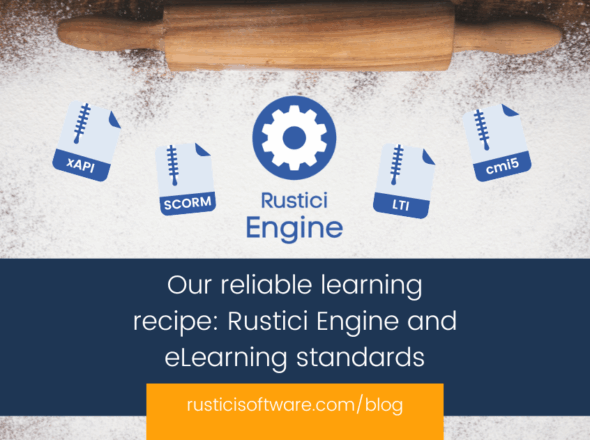Rustici Engine 2019.1 is now available! We’re excited about this release, not only because Engine is getting new features and functionality, but because it broadens the focus of our flagship product from being the best implementation of eLearning standards to being the best way to deliver eLearning content to your learners.
That may sound like a distinction without a difference, but consider all the different content types LMSs and LXPs have to deliver. Besides the standard SCORM, AICC, and xAPI-based content Engine has long supported, instructors and L&D professionals need to present more types of content that drive value to learners: video, audio, documents, and even URLs.
In addition, they need to access content from the many content libraries and marketplaces available. Unfortunately, that often means taking on expensive custom integration work for LMS and LXP vendors. And beyond delivering training to learners, reports are a must-have to see learners are performing and how content gets used.
With Engine 2019.1, we’re solving all of those problems while continuing to provide the best standards support in the industry.
What’s new in Rustici Engine 2019.1
Deliver and track videos, audio files, and more to your learners
With Engine 2019.1, you can import media files—MP4 video, MP3 audio, and PDF documents—into Engine and deliver them directly to learners just as you would SCORM, AICC, xAPI, and cmi5 courses. You can track how much time your learners spend on this content and whether they’ve completed based on the criteria that you set. More fine-grained tracking is available via Engine’s xAPI LRS.
Share and track URLs, too
Ever wanted to share a link to interesting industry content, a blog post, a SharePoint resource, or just another website with your learners? Now, you can import URLs into Rustici Engine and let learners launch it just like any other content in your LMS or LXP. And, it’s easy to track and report on the results of who accessed these URLs and when, using the same APIs already in place for other Engine courses.
Integrate with third-party content libraries and platforms
Getting access to large third-party content libraries is a killer feature for LMSs and LXPs and for content publishers, it puts your content in front of new audiences. But creating and maintaining custom integrations with each platform’s unique API is a ton of work. With our new content connectors*, we do the heavy lifting for you. You get a single API for your application to access content from one or more content libraries and that content seamlessly integrates with Engine’s existing import, launch, and results tracking APIs.
We’re announcing our first connector very soon and more are in the works, so keep an eye out!
Get more visibility into learner performance and course data
Now that Engine is handling the import, delivery, and tracking of content in your learning application, what should you do with all of that resulting data? For it to be of any use, you need to build reports from it. Engine’s new reporting extension* gives you a big head start using a simple API for generating reports that can be embedded in your application’s UI (or exported as .csv or JSON for further processing and analysis).
Have more specialized reporting requirements? The reporting extension also has a more advanced API that lets you report on anything that can be expressed in an xAPI statement.
*Content connectors and the reporting extension require an additional license.
Wrap up
With Engine 2019.1, we’re excited to give you more flexibility and options with the types of content you’re able to deliver to your learners, the data you can report on, and how you’re connecting your LMS or LXP with content marketplaces and providers.
Ready to get started with Rustici Engine or want to kick off an upgrade? We’re here to help: contact us.


